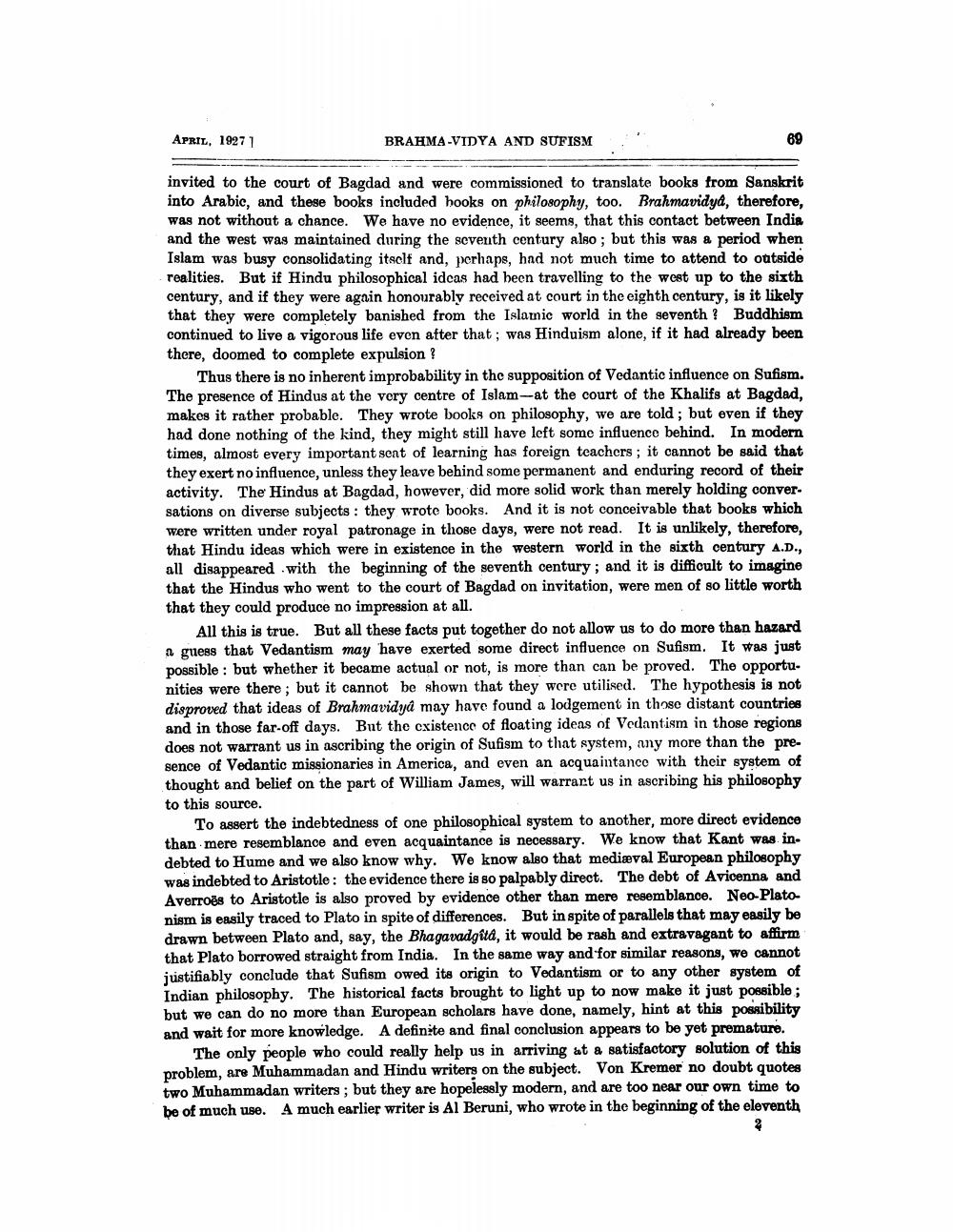________________
APRIL, 19271
BRAHMA-VIDYA AND SUFISM
invited to the court of Bagdad and were commissioned to translate books from Sanskrit into Arabic, and these books included hooks on philosophy, too. Brahmavidyd, therefore, was not without a chance. We have no evidence, it seems, that this contact between India and the west was maintained during the seventh century also; but this was a period when Islam was busy consolidating itselt and, perhaps, had not much time to attend to outside realities. But if Hindu philosophical ideas had been travelling to the west up to the sixth century, and if they were again honourably received at court in the eighth century, is it likely that they were completely banished from the Islamic world in the seventh? Buddhism continued to live a vigorous life even after that; was Hinduism alone, if it had already been there, doomed to complete expulsion ?
Thus there is no inherent improbability in the supposition of Vedantic influence on Sufism. The presence of Hindus at the very centre of Islam--at the court of the Khalifs at Bagdad, makes it rather probable. They wrote books on philosophy, we are told; but even if they had done nothing of the kind, they might still have left some influence behind. In modern times, almost every important seat of learning has foreign teachers; it cannot be said that they exert no influence, unless they leave behind some permanent and enduring record of their activity. The Hindus at Bagdad, however, did more solid work than merely holding conversations on diverse subjects: they wrote books. And it is not conceivable that books which were written under royal patronage in those days, were not read. It is unlikely, therefore, that Hindu ideas which were in existence in the western world in the sixth century A.D., all disappeared with the beginning of the seventh century; and it is difficult to imagine that the Hindus who went to the court of Bagdad on invitation, were men of so little worth that they could produce no impression at all.
All this is true. But all these facts put together do not allow us to do more than hazard a guess that Vedantism may have exerted some direct influence on Sufism. It was just possible : but whether it became actual or not, is more than can be proved. The opportunities were there, but it cannot be shown that they were utilised. The hypothesis is not disproved that ideas of Brahmavidyd may have found a lodgement in those distant countries and in those far-off days. But the existence of floating ideas of Vedantism in those regions does not warrant us in ascribing the origin of Sufism to that system, any more than the presence of Vedantic missionaries in America, and even an acquaintance with their system of thought and belief on the part of William James, will warrart us in ascribing his philosophy to this source.
To assert the indebtedness of one philosophical system to another, more direct evidence than mere resemblance and even acquaintance is necessary. We know that Kant was in. debted to Hume and we also know why. We know also that medieval European philosophy was indebted to Aristotle: the evidence there is so palpably direct. The debt of Avicenna and Averroès to Aristotle is also proved by evidence other than mere resemblance. Neo-Platonism is easily traced to Plato in spite of differences. But in spite of parallels that may easily be drawn between Plato and, say, the Bhagavadgita, it would be rash and extravagant to affirm that Plato borrowed straight from India. In the same way and for similar reasons, we cannot justifiably conclude that Sufism owed its origin to Vedantism or to any other system of Indian philosophy. The historical facts brought to light up to now make it just possible; but we can do no more than European scholars have done, namely, hint at this possibility and wait for more knowledge. A definite and final conclusion appears to be yet premature.
The only people who could really help us in arriving at a satisfactory solution of this problem, are Muhammadan and Hindu writers on the subject. Von Kremer no doubt quotes two Muhammadan writers; but they are hopelessly modern, and are too near our own time to be of much use. A much earlier writer is Al Beruni, who wrote in the beginning of the eleventh




